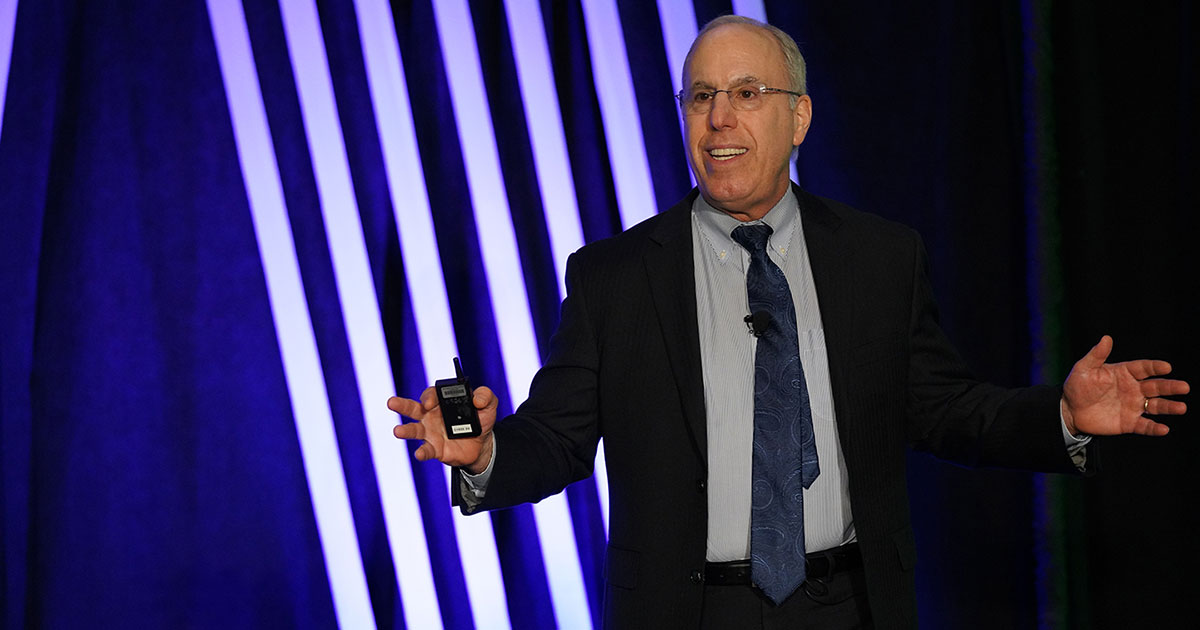Teaching Others the Ways of Entrepreneurship Education at USASBE

For more than 35 years, the United States Association for Small Business and Entrepreneurship (USASBE) conference has been an annual source for hundreds of entrepreneurship educators to learn from the best and bring that knowledge back to the classroom.
A number of Babson College thought leaders presented at this year’s conference on Interdisciplinary & Experiential Entrepreneurship Education in New Orleans on topics ranging from leadership to investing.
Why Higher Education Matters
President Stephen Spinelli Jr. MBA’92, PhD was honored with the John E. Hughes Award for Entrepreneurial Achievement. Established in 2018, the award recognizes the demonstration of a unique ability to accept and manage risk, exercise personal control, and acquire personal rewards via sustained entrepreneurial initiatives, according to the organization’s website.
During the conference, he keynoted a session titled Higher Education on the Precipice: Why Entrepreneurship Matters More Than Ever.
With the National Student Clearninghouse Research Center reporting that 250,000 fewer students attending college compared to 2018, and with Bloomberg Businessweek reporting that future forecasts indicate a further decline in enrollment, Spinelli said the need for entrepreneurship education has never been greater.
As artificial intelligence and robotic process automation continue to grow, skills such as creativity, problem solving, and leadership will play a vital role in our future marketplace. Citing the Babson Academy for the Advancement of Global Entrepreneurial Learning and the establishment of the Arthur M. Blank School for Entrepreneurial Leadership, Spinelli said innovation in higher education will provide successful and proven avenues to solve global problems and create sustainable value.
“This is a time of unprecedented opportunity for entrepreneurial leaders who are nimble, opportunity-driven, innovative, and growth-oriented,” he said.
Using Your Expertise to Communicate Value
Adjunct lecturer Beth Goldstein presented a workshop on creating an authentic brand by defining unique expertise.
Through a series of role-playing exercises which included creating and pitching a brand message, participants learned how they can empower students to communicate their unique value to stakeholders and effectively deliver their brand message. Goldstein has previously used the exercise with students, entrepreneurs, and executives in small firms and Fortune 500 companies.
Finding Empathy in Entrepreneurship
Associate Professor of Entrepreneurship Erik Noyes led an exercise in complete darkness, during which participants were split into teams and asked to create lists of how their lives would be affected without electricity. After learning of the total impact a lack of electricity has on daily life, and with a newfound empathy for those who live without it, participants discussed ways to build this empathy into entrepreneurship education.
Creating Entrepreneurial Ideas, In and Out of the Classroom
Professor Heidi Neck presented at two pre-conference workshops. In the first, educators learned how they can establish experiential learning exercises for their students by drawing from their own experiences. “Though many are talking and writing about the need for teaching experientially in entrepreneurship education, few are addressing how to create the experiences for our students,” Neck wrote.
The second, based off a recently released book, used The IDEATE Method—a technique proven to help students create entrepreneurial ideas with a high potential for success. Practice and repetition are stressed as novice entrepreneurs are guided through identifying, enhancing, and evaluating their ideas.
Helping Women Become Angel Investors
Professor emeritus Patricia Greene was honored with the Max S. Wortman Jr. USASBE Lifetime Achievement Award for Entrepreneurship, presented in recognition of entrepreneurial achievements that encompass the ideals of entrepreneurial activity.
Greene has produced more than 80 publications and seven books during her academic career.
“I have had the opportunity to work closely with Patti on numerous initiatives and have observed firsthand the myriad contributions she has made to fostering entrepreneurship,” Professor Richard Bliss said. “No one is more deserving of the award.”
Greene also spoke at a pre-conference workshop titled Deal Flow, Angel Investment, and Venture Capital Training, where participants explored how to teach women business owners to prepare for angel investors and also how to become angel investors themselves.
Additional Presentations and Honors
Susan Duffy, executive director for The Center for Women’s Entrepreneurial Leadership, took part in professional development panel, Creating Clarity: Candid Sessions for Aspiring Center Directors and Administrators.
Professor William Gartner also joined a Meet the Editors panel with Noyes, and Neck joined a Doctoral Consortium with more than a dozen speakers and professors.
Lauren Beitelspacher, Joanna Carey, Jennifer Tosti-Kharas, and Elizabeth Swanson presented at a session on the role of entrepreneurship education in driving sustainability.
Babson College’s Women Innovating Now (WIN) Lab® was named a finalist for the Excellence in Entrepreneurship Education Award, which is presented to bold and innovative programs that make an impact in entrepreneurship education.
Posted in Insights




